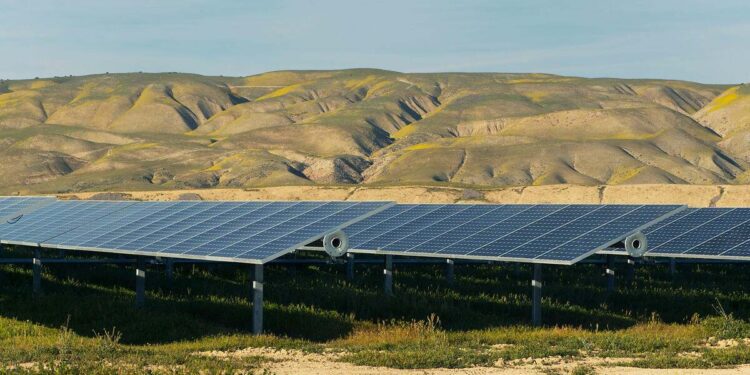A group of 23 energy ministers from the European Union and a hundred sector companies have just given the green light to the so-called ‘Solar Charter’ with the intention of reducing dependence on China and boosting the development of an industrial chain in this sector at a time when a steep price drop has left around twenty projects that were being prepared in Europe out in the cold. The agreement comes during the visit of the German Chancellor, Olaf Scholtz, to China after European pressure has increased due to the aid Chinese companies are receiving to strengthen their position in the renewable energy (wind and solar) and electric vehicle businesses.
Solar energy, particularly photovoltaics, is currently the fastest-growing renewable energy source in the EU. Last year, 56 GW of photovoltaic solar energy was installed in the EU, two-thirds of which were on rooftops, allowing consumers to protect themselves from high electricity prices and reduce land use.
The installations in 2022 and 2023 saved the equivalent of 15,000 million cubic meters of Russian gas imports in total, mitigating the risk of gas supply interruption to the Union. In addition, the sector provides around 650,000 jobs, 90% of them in the deployment part, and this number is expected to increase to nearly 1,000,000 by 2030.
Achieving the EU’s goal of reaching at least 42.5% of renewable energy by 2030, with the ambition to reach 45%, will require further acceleration of the deployment of renewable energies, including solar.
Most of the demand for solar modules in Europe is covered by imports from a single supplier, China, a concentration that creates short-term risks for the value chain’s resilience and long-term risks for the stability of solar panel prices. Access to affordable solar modules from diverse sources, as well as a resilient, sustainable, and competitive European solar value chain, is therefore necessary to achieve deployment rates in line with the mentioned objectives while improving supply security and mitigating the risk of supply chain interruptions.
However, European manufacturers of solar modules have faced a particular challenge due to a combination of import dependency and a sharp drop in prices of imported panels.
In 2023, the photovoltaic solar sector in the EU and worldwide saw panel prices plummet from around 0.20 EUR/W to less than 0.12 EUR/W. This unsustainable situation is weakening the viability of existing European production and jeopardizing planned investments for new manufacturing plants announced in the last two years. As a result, some European companies have downsized their operations, announced a priority for production in other international markets, particularly the US, or even announced closure.
The European Solar Industry Alliance (ESIA), established in December 2022 to reinforce cooperation within the industry, set a target of 30 GW of production capacity along the value chain, a target considered achievable by 2030. The Net Zero Industry Act (NZIA), on which political agreement was reached in February, aims to ensure that the Union’s global strategic manufacturing capacity for net-zero technologies, including photovoltaic solar, approaches or reaches at least 40% of annual deployment needs by 2030. The act includes specific measures such as accelerating permit issuance or facilitating market access by using criteria other than price in public procurement, renewable energy auctions, and other support schemes.
However, new urgent short-term measures are needed to address the crisis in the European industry. All stakeholders – the Commission, Member States, and companies active along the European photovoltaic solar value chain – must ensure that the transition and European industrial goals go hand in hand.
To this end, the European Solar Charter establishes immediate measures that the Commission, Member States, and representatives of the photovoltaic energy value chain, particularly wholesalers, distributors, and manufacturers, must adopt while ensuring full compliance with EU competition and state aid rules.
The Charter calls on companies – and, above all, the governments of EU Member States – to commit to: a series of voluntary actions, such as including photovoltaic solar products in the portfolios of relevant market players and incorporating resilience considerations into the contracting strategies of photovoltaic operators.
Maintain and, where possible, expand current production capacity in Europe in line with the growing forecast demand for their products based on public and private commitments.
An early implementation of the relevant Net Zero Industry Act and the promotion of innovative forms of solar energy deployment, such as agricultural photovoltaics, floating photovoltaics, infrastructure-integrated photovoltaics, vehicle-integrated photovoltaics, or building-integrated photovoltaics.
The EU Solar Charter was signed in Brussels at the Egmont Palace by 23 Member States: Germany, Austria, Belgium, Bulgaria, Croatia, Czech Republic, Denmark, Slovakia, Slovenia, Spain, Estonia, Finland, France, Greece, Hungary, Italy, Latvia, Lithuania, Luxembourg, Poland, Portugal, Romania, and the Netherlands.
Eduardo Irastorza, a professor of global environment at OBS Business School, explained that Europe has reservations for China to enter the market for a simple reason: China fully controls electric vehicle production, is a world leader in electric production, and logically wants to control alternative energies. Considering that China has long-term strategies, it can afford to operate at a loss for a long time, more than many European countries and private companies can. Given the state support for Chinese energy companies, this country could take over the European wind market in a very short time. It is a competitive loss strategy that will allow China to acquire a hegemonic leadership position and get rid of its competition. Hence the threat the EU is detecting.
China’s willingness is to control the entire renewable energy market in ten years. It must be taken into account that China does not have oil, and its commitment is necessary since Europe is stepping back in energy transition. In fact, brands like Volkswagen have already declared their intention to stop producing more electric cars and focus on fossil fuel engines.


